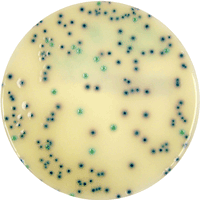Thermo Fisher Scientific increases production of screening solutions in response to E. coli crisis in Europe
- Like
- Digg
- Del
- Tumblr
- VKontakte
- Buffer
- Love This
- Odnoklassniki
- Meneame
- Blogger
- Amazon
- Yahoo Mail
- Gmail
- AOL
- Newsvine
- HackerNews
- Evernote
- MySpace
- Mail.ru
- Viadeo
- Line
- Comments
- Yummly
- SMS
- Viber
- Telegram
- Subscribe
- Skype
- Facebook Messenger
- Kakao
- LiveJournal
- Yammer
- Edgar
- Fintel
- Mix
- Instapaper
- Copy Link
Posted: 6 June 2011 | Thermo Fisher Scientific | No comments yet
Thermo Fisher Scientific, has responded to the E. coli O104 crisis in Europe…


Thermo Fisher Scientific, the world leader in serving science, has responded to the E. coli O104 crisis in Europe by increasing production and distribution of its Brilliance™ ESBL Agar plate, a chromogenic screening plate for the detection of Extended Spectrum Beta-Lactamase-producing (ESBL) organisms, such as the outbreak strain, within 24 hours.


Thermo Fisher Scientific has responded to the E. coli O104 crisis in Europe by increasing production and distribution of its Brilliance™ ESBL Agar plate, a chromogenic screening plate for the detection of Extended Spectrum Beta-Lactamase-producing (ESBL) organisms, such as the outbreak strain, within 24 hours. Culture on Oxoid Brilliance ESBL Agar can help determine the resistance status of an isolate.
With worldwide concern over E. coli O104, food microbiologists need to ensure that they can detect enterohaemorrhagic E. coli (EHEC) in foods, water and food processing environments in order to prevent, investigate or combat outbreaks of EHEC-related food poisoning. The current outbreak highlights the importance of rapid and reliable identification of EHEC, which cause bloody diarrhoea and haemolytic uraemic syndrome (HUS), for the assurance of food safety. This large outbreak is unusual in several other ways. Historically, most outbreaks of HUS have been associated with E. coli O157, but the current outbreak strain belongs to the E. coli O104 serogroup. The causative strain produces Shiga toxin 2 and shows high resistance to 3rd generation cephalosporins (due to ESBL resistance mechanism), as well as broad antimicrobial resistance to, among others, trimethoprim/sulphonamide and tetracycline (ref 1.). Media to detect ESBL are among the methods recommended when screening for the outbreak strain.
When undertaking identification of the outbreak strain from food samples, by using Oxoid and Remel products (Thermo Fisher Scientific), you have the reassurance of products that have been developed by scientists with a heritage in microbiology. Our range includes:
- Culture on Oxoid Brilliance ESBL Agar can help determine the resistance status of an isolate
- Enrichment in Oxoid Modified Tryptone Soya Broth with Novobiocin, Oxoid E.C. Broth with or without reduced bile salts or Oxoid Buffered Peptone Water supplemented with antibiotics
- Isolation media such as Oxoid MacConkey Agar
- Toxin detection using the Oxoid VTEC-RPLA kit, following growth on Oxoid Brain Heart Infusion Agar
- Antimicrobial susceptibility testing on Oxoid Iso-Sensitest Agar or Mueller-Hinton Agar with cefpodoxime combination discs. Culture on Oxoid Brilliance ESBL Agar can also help determine the resistance status of an isolate.
- Identification using the DuPont Qualicon RiboPrinter® microbial characterization system (which is available from representatives of Oxoid products in Europe, Canada and Australia).
EHEC/HUS outbreak
The EHEC outbreak in northern Germany is one of the largest outbreaks of EHEC/HUS to have occurred in the world. Many cases have been admitted to hospital suffering bloody diarrhoea and HUS. Patients with HUS may require intensive care, dialysis and/or plasmapheresis, which puts severe strain on hospital resources (ref 1.). The age and sex distribution of this outbreak is atypical, with the majority of cases occurring in young to middle aged women. Cases of HUS resulting from EHEC are normally associated with children under 5 years of age and show no sex bias (ref 1.).
On 2nd June 2011, there were 470 confirmed cases in Germany of which 17 had died, with many more cases reported in other parts of Europe, including Sweden (15 cases, including one death), Switzerland, Denmark, the Netherlands and the UK (ref 2.).
Haemolytic uraemic syndrome is usually associated with the consumption of raw/undercooked meat or unpasteurized milk. This particular outbreak was linked to the consumption of raw salad vegetables, and Russia has banned importation of fresh vegetables from Europe, although the actual source in now in doubt (ref 2.).
Further information about the products available from Thermo Fisher Scientific for the identification of E. coli O104 and other EHEC, customers should contact their local Oxoid and Remel products representative, or visit www.oxoid.com or www.remel.com.
Oxoid and Remel are specialty microbiology brands of Thermo Fisher Scientific Inc., the world leader in serving science.
References
- Frank C, Faber MS, Askar M et al (2011) Euro Surveill 16(21):pii=19878
- BBC News 2nd June 2011 http://www.bbc.co.uk/news/world-europe-13625271




